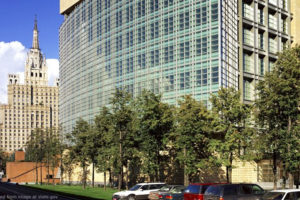U.S. Ambassador Returns To Russia After Two Months

(Article text ©2021 RFE/RL, Inc., Radio Free Europe/Radio Liberty – rferl.org – June 24, 2021 – article text also appeared at rferl.org/a/russia-us-ambassador-returns/31324503.html)
U.S. Ambassador John Sullivan has returned to Moscow, two months after leaving amid worsening relations between the United States and Russia.
“Arrived back in Moscow today. Ready to work with…Russia on our goal of a stable and predictable relationship between our countries,” Sullivan said in a statement shared on Twitter by the embassy spokesman.
Sullivan was recalled for consultations in April as the United States and Russia announced tit-for-tat sanctions and diplomatic expulsions.
In an interview with Interfax, Sullivan said the two countries would communicate on a range of issues.
“We should cooperate where it is in our mutual interest, and where we have disagreements — and we have significant disagreements — it is important to have an open and frank dialogue,” Sullivan said.
After their June 16 summit in Geneva, U.S. President Joe Biden and Russian counterpart Vladimir Putin announced their ambassadors would soon be returning to their missions in a bid to lower tensions.
Russian Ambassador Anatoly Antonov returned to the United States on June 20, telling Russian media that he was optimistic and wanted to help build “equal and pragmatic” relations.
Antonov was recalled in March following a comment by Biden indicating he agreed that Putin is a “killer.”
Relations between Russia and the United States have deteriorated further since Biden took office in January, with Washington imposing sanctions on Moscow over cyberattacks, election meddling, and the poisoning and jailing of opposition politician Aleksei Navalny.
But Biden has also said the United States wants a “stable, predictable” relationship that allows Moscow and Washington to work together on common issues like strategic stability, arms control, and climate change.
